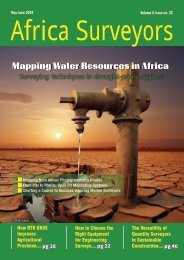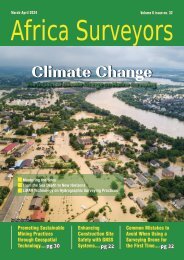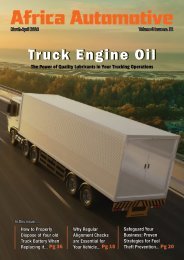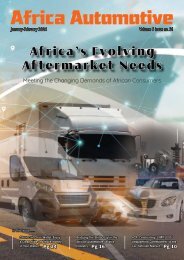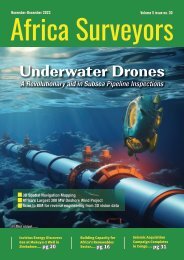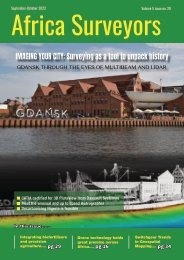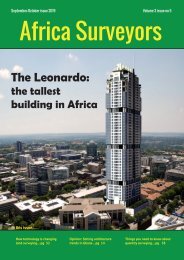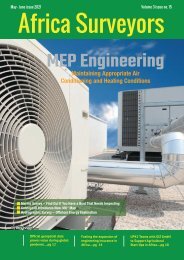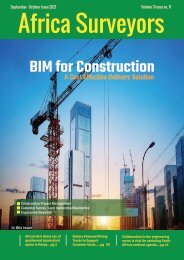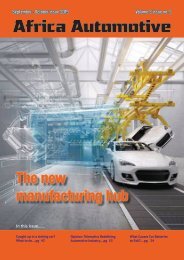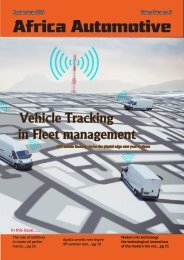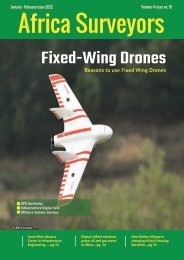Africa Surveyors May-June issue 2023 digital
Africa Surveyors is Africa’s premier source of Surveying, Mapping and Geospatial news and an envoy of surveying products/service for the Construction, Maritime, Onshore & Offshore energy and exploration, Engineering, Oil and Gas, Agricultural and Mining sectors on new solution based trends and technology for the African market.
Africa Surveyors is Africa’s premier source of Surveying, Mapping and Geospatial news and an envoy of surveying products/service for the Construction, Maritime, Onshore & Offshore energy and exploration, Engineering, Oil and Gas, Agricultural and Mining sectors on new solution based trends and technology for the African market.
Create successful ePaper yourself
Turn your PDF publications into a flip-book with our unique Google optimized e-Paper software.
RADIOMETRICS SURVEY<br />
Susanne Scholz, Application<br />
Engineer - Vexcel Imaging<br />
David Armah, Director - Business<br />
Development - A-M Surveys Ltd<br />
Howard Barrie, President -<br />
Terraquest<br />
Ramesh Acharya Gundi, Chief<br />
Geophysicist - Mcphar international<br />
radiometric survey and it is therefore important that a careful control<br />
of the background radiation is maintained during the survey operation.<br />
For example, the survey area can be surveyed in stages to ensure that<br />
there is no deterioration in the natural background before the next<br />
stage.<br />
“During the radiometric calibration, a series of images is captured,<br />
including color targets, white fields, and dark frames. The use of<br />
calibrated shutters ensures a consistent amount of light enters the<br />
camera system. The illumination of the calibration environment is<br />
crucial and requires a stable light source that closely approximates the<br />
spectrum of the sun. By employing a calibrated spectrometer, the light<br />
source can be carefully monitored throughout the calibration process,”<br />
enlightens Susanne.<br />
“The most important aspect of radiometric surveys in my candid<br />
opinion is, ACCURACY,” asserts David Armah, Director of Business<br />
Development and Admin at A - M Surveys Ltd.<br />
“The measuring and analysing the levels of radiation in a given area<br />
to identify and characterize radioactive materials or sources. These<br />
Accurate measurements are crucial for various reasons:<br />
Safety: In the survey conducted to assess potential radiation,<br />
hazards to; and the safety of individuals and the environment must<br />
be ensured. Accurate measurements help identify areas with elevated<br />
radiation levels, allowing for appropriate safety measures and<br />
precautions to be implemented.<br />
For Environmental Monitoring: Radiometric surveys play a vital role<br />
in monitoring environmental radioactivity, such as in nuclear power<br />
plants, waste management facilities, or areas affected by nuclear<br />
accidents. Accurate measurements are necessary to track any changes<br />
in radiation levels over time and detect any potential environmental<br />
contamination.<br />
Resource Exploration: Particularly in the mining industry, to identify<br />
and assess deposits of radioactive minerals such as uranium or<br />
thorium. Accurate measurements are crucial for determining the<br />
extent, grade, and economic viability of these deposits.<br />
Radiometric surveys contribute to Scientific Research; in various<br />
fields, including geology, archaeology, and environmental studies.<br />
Accurate measurements provide reliable data for studying geological<br />
formations, dating artefacts using radioactive isotopes, and<br />
understanding natural radiation background levels,” highlights David.<br />
David emphasizes that,to ensure the accuracy in radiometric surveys as<br />
stated above, several factors should be considered, including<br />
1. calibration of instruments<br />
2. Appropriate sampling techniques,<br />
3. proper shielding from external radiation sources,<br />
4. Quality assurance and Quality control procedures,<br />
5. Expertise of trained professionals who can accurately interpret and<br />
analyse the collected data.<br />
Image: courtesy<br />
22 <strong>May</strong>-<strong>June</strong> <strong>issue</strong> l <strong>2023</strong> www.africasurveyorsonline.com




